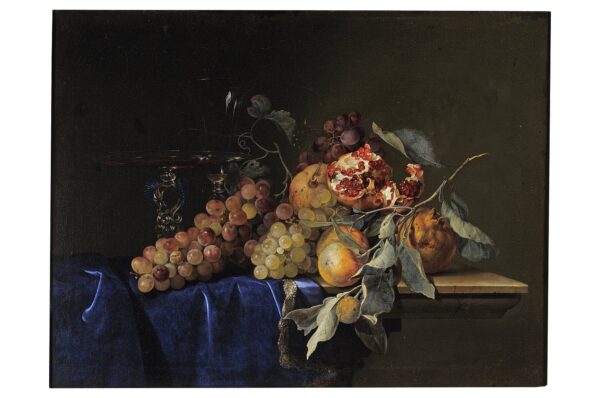
Willem Van Aelst’s Still Life
Two days after Italy declared total lockdown, starting on March 10, the Uffizi, Palazzo Pitti and the Boboli Gardens changed from being a conventional museum conglomerate to a virtual one by setting up free video virtual tours of its collections on its Facebook account(www.facebook.com/uffizigalleries/video. Announced only four days before by the Uffizi’s press office, “Uffizi d Mangiare”, began on January 17, 2021. This, the latest series of the Uffizi free videos, does not guide a tour through a section of the museum; nor is it hosted by Director Eike Schmidt or one of his curators. Rather it concerns for now paintings of food and drink in the collections presented by a famous chef or another person esteemed in the eno-gastronomic world. A different commentator will feature a different painting every Sunday throughout the spring and maybe even longer. The commentator will discuss the painting’s different edible ingredients and provide a recipe for one.
“In the last decades, the bond between art and gastronomy has become a real subject of study and of history,” said Schmidt in the Uffizi‘s press release. “With these short videos, each lasting approximately five minutes, we aim to create an even stronger bond with our public thanks to these artworks by including them in a contemporary and vital context. The food in each painting—either part of a scene or a still life-and then shown being cooked by our commentator in the video should stimulate the viewer and bring to the fore the ingredients’ deep and often unexpected and hidden significances.”
The press release went on to announce the first five episodes of “Uffizi da Mangiare”. The first commentator was the well-known TV personality, prolific author and Chef Fabio Picchi, owner of Cibrèo, a cooking school of the same name, both in Florence, and of Picchi’s nearby Teatro del Sale, where his actress wife Maria Cassi performs monologues while he cooks. Membership or reservations here, now on hold, have always been required. For “Uffizi da Mangiare”’s opening Picchi does not describe the fruits in the series’ “cover painting”, Willem Van Alest’s (1627-83) “Still Life with Fruit”, which Andrea Acampa of the Uffizi confirmed to me by phone will be a future episode. Instead with his customary enthusiasm Picchi described the ingredients of “The Boy with a Basket of Fish” by Milanese Giacomo Ceruti (1698-1767) and its protagonist’s semi-frozen chapped fingers; the second commentator was Dario Cecchini, butcher and restaurateur of “Antica Macelleria Cecchini” in Panzano in Chianti in front of the various meats on display in “A Peasant’s Larder with Wine Barrels, Game, Meats, and Crockery”, by Jacopo Chimenti known as “L’Empoli” (1551-1640); the third commentator, Milanese pastry chef Debora Massari , daughter of the super famous pastry chef and author Iginio Massari, will propose three cakes to celebrate the wedding anniversary on January 31, 1503 of the very wealthy Florentine fabric merchant and art patron Agnolo Doni (1474-1539) and his wife aristocrat Maddalena Strozzi (1489-1540). Raphael painted their portraits between 1504 and 1507. Massari’s third cake will reproduce the “Doni Tondo” of the holy Family commissioned by Doni and painted by Michelangelo between 1505-06;l fourth commentator Valeria Piccini, the chef at “Da Caino” with a Michelin-star at Montemerano in the province of Grosseto, will propose a menu for a dish in Chimenti’s “Still Life”; and the fifth commentator Marco Stabile, another chef with a Michelin star at “L’Ora d’Aria” in Florence will present a recipe inspired by “Peppers and Grapes” by De Chirico (1888—1978).
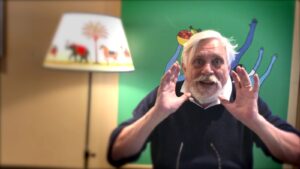
Fabio Picchi
I have known super Florentine and super extrovert Fabio Picchi for more than two decades and watched over the years with admiration the well-deserved expansion of his food and entertainment “empire”. From his video I learned that it was our responsibility to pass to the next generation what we’ve learned about our gastronomic past; that gastronomy is patrimony. Concerning Ceruti’s painting he explained that often authors misidentify the granseola or spider crab as a lobster more commonplace elsewhere. The spider crab, ubiquitous along the Italian coasts, is a particularly specialty of the Tuscan island of Elba. Picchi’s recipes are a simple homemade mayonnaise to dress the slowly-boiled crab and a tomato sauce with a touch of marjoram and basil and the crab’s meat (and if lucky its eggs) for a pasta dish.
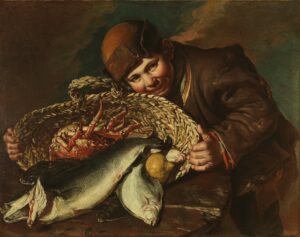
Ceruti’s “Boy with Basket of Fish”
Instead Cecchini, the scion of a Chianti family for generations, chose a “Costata alla Fiorentina”, a smaller sister of Tuscany’s world famous steak on the bone, a giant T-bone, from Chimenti’s peasants’ larder during wintertime when it would be full. He taught me some of his professional secrets-a Tuscan legend: 1) that the success of this succulent dish is that the steak should first be placed standing up in the grill not lying flat. That way some of the fat will drip away. 2) The steak should then be cooked 8 minutes on each side over an oak wood fire until it’s crispy on the outside and thus still rare on the inside 3) that the meat should not be salted or oiled while it’s cooking, but only afterwards and with Tuscan olive oil, and 4) that, it goes without saying, it should be accompanied by a glass of Tuscan red wine.
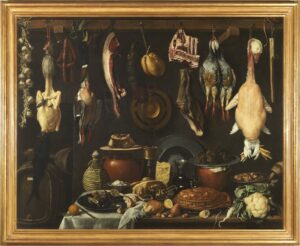
Chimenti’s “Peasants’ Larder”
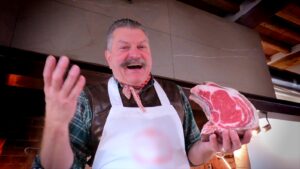
Dario Cecchini
Thus, wanting to know more about the next three announced future episodes and maybe receive a program of the whole series, Andrea Acampa kindly put me in touch with the art historian Francesca Sborgi, since 2018 a Public Relations officer for MIBACT (Italy’s Ministry of Culture and Tourism). In gist here’s what she told me.![]()
“The original idea for “Uffizi da Mangiare was mine,” she said, but it was immediately developed by the Galleries’ digital strategists with input from Director Schmidt. Luckily the Museum conglomerate and the boboli Gardens have reopened on January 25, but during our Spring and then our Fall lockdowns, food and the arts, in many cases paintings, were constantly on many people’s minds.”

Francesca Sborgi
“As for ‘Uffizi da Mangiare’, we began by making a preliminary list of chefs,” she continued, “to whom we presented the project. When the idea was accepted, we worked together to put together the contents of each video to project on our Facebook account. Next came choosing a short list of some of the Museums’ most beautiful Still Lifes of foodstuffs: vegetables, fruits, game, meats and fish, dating from the 16th to the 20th century. The several episodes presented in the press release are only the very beginning. Paintings by the artists: Caravaggio, Casorati, and Garzoni, also listed there, will probably follow next. We are hoping to include episodes also about botany from our Boboli Gardens and of course to include wine. At this time I cannot tell you more, except that that we are adding English subtitles to our four already produced episodes. The others are still in the planning stages, but will include many pleasant surprises. The art will only be from the Uffizi Galleries’ collections, but will not be limited to paintings. Also included will be sculptures, watercolors, prints, books, and the applied arts. Some of our future chefs or other eno-gastromic commentators will not be limited to Tuscany or Italy, but will be experts from other countries.
Despite Dottroessa Sborgi’s reticence about the contents of future episodes, my own research led me to discover that the Uffizi Galleries is home to only one Caravaggio, “The Adolescent Bacchus” and one Casorati, “The Foreignor”, but owns too many works by Giovanna Garzoni, the subject of a splendid monographic exhibition, on display sadly for the most part during the first lockdown, for me to pinpoint which of her many superb still lifes will be featured in “Uffizi da Mangiare”. Of course, their commentators are still to be decided.
To end on a gratifying note, to my question: “Since Italian cuisine is so popular worldwide, would the Uffizi consider putting together a book of the episodes, obviously with a photograph of each painting plus the commentators’ remarks and recipes, but also with a biography of each commentator and a history of each painting and its artist?”, Sborgi answered: “That’s a wonderful idea. However, first we have to develop the project further and evaluate its success.”
As the moment of submitting this article 15,364viewers had watched Picchi and 25,586 Cecchini. That’s up just over night from 14,938 for Picchi and 22,577 for Cecchini. So I’m feeling optimistic.
